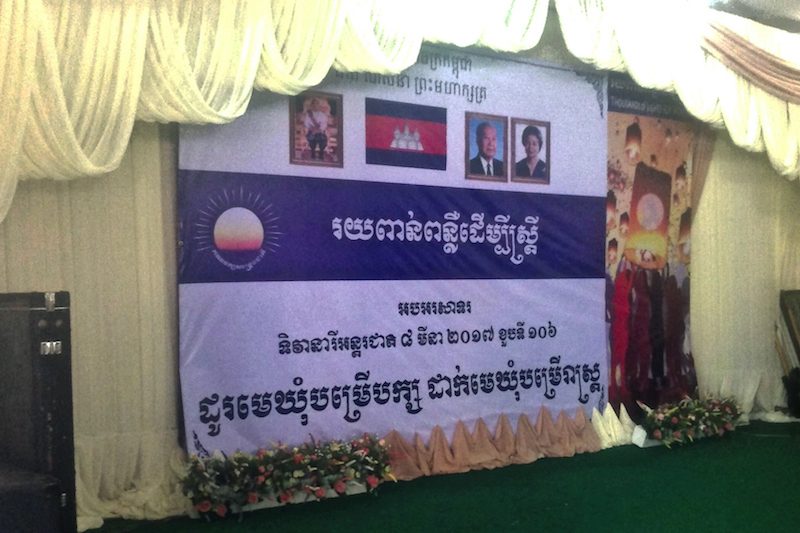Moul Virak, commune chief of Phnom Penh’s Russei Keo commune, says that his constituents are mad.
He blames it on the CNRP’s campaign slogan—which promises to “change commune chiefs who serve the party and replace them with commune chiefs who serve the people”— according to a letter published by government mouthpiece Fresh News on Thursday. His is one of hundreds of similar letters from CPP commune chiefs released over the past week.

The slogan “insults the loyalty of the people who elected us as commune chiefs,” the letter claims.
If interviews with a handful of residents of his commune last week are any indication, however, Mr. Virak is right about the anger, but wrong about its cause.
“The rich people are still rich, and the poor people are still worse off,” said Chann Saren, a 66-year-old seamstress who was bicycling home along National Road 5. “I see that the commune chief right now seems to serve the party rather than the people.”
The CPP won the commune in the north of the capital by about 900 votes in the 2012 local elections. This time around, residents said it was the government’s poor performance rather than CNRP sloganeering that fueled their distrust of the ruling party.
If anything, they said, the CPP’s outcry over the slogan seemed to highlight a deepening, fear-driven rift between the party and the people who once voted for it.
Ms. Saren, a onetime CPP campaigner married to a soldier, is not the only one in the commune with deep reservations about the government, even as its paychecks to her husband keep their lights on.
At a coffee shop a few hundred meters down the road, a village chief and commune police officer expressed gnawing doubts with the commune boss.
“There’s nothing wrong with the slogan,” said the 55-year-old officer, who asked to remain anonymous for fear of losing his job. “Because if the commune chief serves the party, how can we keep him as chief? I work for the government, but we don’t dare to say how bad corruption really is.”
“You are Khmer, you are Khmer, I am Khmer,” said the village chief, who is in his seventies. He also requested anonymity. “We all understand what is happening.”
“I suggest the top government officials stop fighting the opposition,” the officer said. “This commune area is very poor, so why don’t you find a solution for us?”
In his letter, Mr. Virak claimed he’s done just that. He boasted of overseeing the construction of 21 new concrete roads and as many drainage systems, the maintenance of local canals, and the issuance of thousands of birth certificates, ID cards and residency documents.
“We do not serve the party, we serve the people, without discrimination to their political affiliation,” he said by telephone on Sunday, adding that the CNRP’s slogan “is a serious insult to our efforts” to develop the commune.
Phnom Penh municipal governor Pa Socheatvong made similar points in a speech on Friday, threatening the CNRP with legal action if the party continued to use a slogan implicitly attacking CPP commune chiefs.
“When they talk about this platform, it affects our people’s feelings and causes serious stigma to our commune chiefs’ efforts,” City Hall spokesman Met Measpheakdey said on Sunday.
But the village chief estimated that commune- and district-level authorities approved just one out of every 10 requests he submitted for village infrastructure and service projects.
“When our boss is talking, it is opposite from what we learn from the radio,” he said, comparing instructions from commune and district officials to the news he listened to on Radio Free Asia.
“The top leaders say only good things, never the negative things.”
An undercurrent of fear created by the government’s prickly relationship with its critics taints how locals interact with authorities, he added.
“You should know why we don’t want to be named,” the police officer said. “Kem Ley criticized a lot, and what happened to him? Kim Sok criticized a lot, and how did that go?”
Kem Ley was shot dead at a convenience store in July, while Mr. Sok was jailed last month for seeming to blame the murder on the government in radio interviews.
Muhammad Omar, a soft- spoken blacksmith resting outside his shop, was also critical of the government’s slow development of the commune but wary of incurring its wrath.
“You see right now, the power is in one leader’s hands,” he said, alluding to Prime Minister Hun Sen. “He can do whatever he wants. If we say something bad, we can be arrested.”
“You are not living in Cambodia, so you don’t know what it’s like,” the 52-year-old said to a foreign reporter. “If you have a problem, you can fly back to your country. How about people who live here?”
The police officer said his boss had ordered him to campaign for the ruling party in the provinces during the 2013 national election—the CPP had far outflanked the opposition in terms of funding, vehicles and manpower, he said.
“But what was the result? We only got a small amount of votes,” he said of the CPP’s worst election showing since 1998.
“In the next mandate, if the government or court still doesn’t provide justice, we cannot guarantee a win,” he said.
Ms. Saren, the seamstress, said she had once received money to help campaign for the CPP, whose efforts to bring peace to the country she appreciated.
“But now, my sympathies have turned toward the opposition,” she said.
“I want to join the opposition party’s campaign, but I don’t dare show my face with them.”




